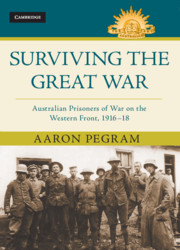Refine search
Actions for selected content:
6 results
Chapter 5 - The most difficult problem
-
- Book:
- Expertise, Authority and Control
- Published online:
- 10 February 2020
- Print publication:
- 11 February 2020, pp 141-178
-
- Chapter
- Export citation
Chapter 4 - A pleasant dose of medicine?
-
- Book:
- Expertise, Authority and Control
- Published online:
- 10 February 2020
- Print publication:
- 11 February 2020, pp 109-140
-
- Chapter
- Export citation

Surviving the Great War
- Australian Prisoners of War on the Western Front 1916–18
-
- Published online:
- 12 November 2019
- Print publication:
- 12 November 2019
Chapter 3 - Giving the game away
-
- Book:
- Surviving the Great War
- Published online:
- 12 November 2019
- Print publication:
- 12 November 2019, pp 66-85
-
- Chapter
- Export citation
Introduction
-
- Book:
- Surviving the Great War
- Published online:
- 12 November 2019
- Print publication:
- 12 November 2019, pp 1-17
-
- Chapter
- Export citation
Chapter 6 - Well fed and plenty of freedom
-
- Book:
- Surviving the Great War
- Published online:
- 12 November 2019
- Print publication:
- 12 November 2019, pp 129-150
-
- Chapter
- Export citation
